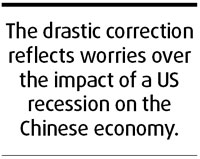Convergence of fears
Updated: 2008-01-23 07:20
The steep two-day plunge in Chinese stocks ostensibly dealt a heavy blow to cheerleaders of the "decoupling" theory.
Optimists once believed that the Chinese economy had grown resilient enough to shrug off a US recession. But the performance of the stock market appears to indicate otherwise.

After diving by more than 5 percent on Monday, the benchmark Shanghai Composite Index tumbled another 7.22 percent to 4,559 yesterday.
The simultaneous sell-off in other global equity markets, amid fears of a US slowdown, lends credence to the argument that China is not yet secure from the risk of a US-led global economic slowdown.
Though China's export growth remained robust last year, more and more people in this country have bought into the notion that exports would decline this year due to weakening external demand.
It is far too early to say how China's export sector will perform this year. Nevertheless, the drastic correction in China's stock markets at least partly reflects domestic investors' growing worries over the impact of a US recession on the Chinese economy.
Policymakers who are engaged in preventing economic overheating and serious inflation should pay close attention to changes in export growth expectations. If the export sector is really hit hard by shrinking external demand, the central government must be quick in cushioning exporters and boosting domestic consumption to keep the economy on track.
However, the regulators who are responsible for developing the stock market while looking after investors' interests should not consider the recent plunge of Chinese shares to be only a reaction to the risk of a global slowdown.
The announcement by Ping An Insurance that it planned to raise an astronomical sum on the domestic stock market must have been a key local factor behind the sharp fall of Chinese shares.
The panic sell-off affecting almost all stocks made it hard to judge to what extent Ping An's shares were dumped in response to worries over its new fundraising plan. But institutional investors' complaints over the lack of consultation prior to the announcement of the plan merit an investigation by the market watchdog.
Irresponsible fund-raising that causes serious fluctuations can be as harmful as the speculation that pushes the market to unsustainable heights. Regulators should step in to defend investors' interests, especially when the market is struggling with both domestic and overseas concerns.
(China Daily 01/23/2008 page8)
|
|
|
|
|
|